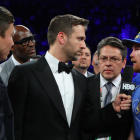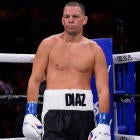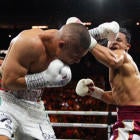There's an old trick in the scripted world of pro wrestling, where the sins of an otherwise disappointing night of entertainment can be erased as long as the fans are sent home happy with a late swerve and exciting ending.
Moments after Canelo Alvarez pitched a shutout against Julio Cesar Chavez Jr. in their dud of a pay-per-view main event on Saturday in Las Vegas, the focus could've easily been on how boxing, once again, failed to deliver on the fans' financial investment when it mattered most. But Golden Boy Promotions and HBO deftly held a hidden ace up their sleeves and made sure to shift the focus onto what's next.
After two years of dragging his feet, Alvarez formally announced his Sept. 16 superfight against Gennady Golovkin at a site to be determined. A video package hyped the crowd, confetti fell from the ceiling and GGG was even called in from backstage to make a late run-in and manufactured staredown in the ring.
The exciting spectacle felt very much like it was borrowed from the world of sports entertainment. There was also a strong element of what makes the UFC so great in play, where the structural control of its own league has long helped MMA's biggest promotion stay prepared to announce its next big fight just seconds after the previous one has ended.
One thing Saturday night didn't feel like was typical boxing of old, and for a sport so in need of an injection of new life fresh off a categorically bad year, void of consistent big fights with crossover appeal, that was the best news of all.
If it takes momentum to breed change, then boxing is kind of hot right now thanks to a four-month start to 2017 that has constantly delivered. And the announcement of Alvarez-Golovkin -- the biggest fight the sport could make this calendar year -- couldn't have come at a better time than it did, just one week after a thrilling slugfest between Anthony Joshua and Wladimir Klitschko appeared to revitalize a dormant heavyweight division.
"Boxing is back, bigger and better than ever," Golden Boy founder Oscar De La Hoya said on Saturday. "It's just like everything. It's like basketball when they lost Kobe [Bryant]. It's like any other sport -- it has its ups and downs.
"Boxing always has its ups and downs. It's like a roller coaster. Right now we are living a great moment in the sport of boxing and we are going to continue it for a long time."
Love boxing? Be sure to subscribe to my podcast In This Corner with Brian Campbell where I break down everything you need to know in the world of boxing.
Optimism, in this case, is certainly key. But it's just as important to acknowledge the pattern that the sport is currently stuck in, having alternated good and bad years for almost a full decade.
It's an interesting debate whether the good years have only appeared as a direct result of the bad. For as long as boxing's crippling lack of organization remains, competing networks and promoters will continue to fight for their dwindling piece of the pie at the expense of the sport as a whole until necessity forces them to intervene.
De La Hoya and Alvarez came off as heroes in announcing the fight simply because they didn't expose themselves as liars, with the reality being that Canelo-GGG could've easily happened last year, when the sport needed it more. It's an indictment of how low the bar has been set, with fans becoming almost preconditioned to assume that greed would win out over logic in all scenarios.
But Alvarez-Golovkin has clear potential to bring nothing but good to the sport, reminding what can happen in boxing when the best agree to face the best -- a business model UFC has spent the last 15 years proving breeds nothing but success and a steady cycle of return business.
Boxing has always retained a timeless simplicity that has made it feel like you were watching a classic antique. But the flip side of that is a sport still too reliant upon its past, with many involved wishing it would return to the days of how it used to be. In some ways, all that has done is stunt its growth.
UFC was brought to stabilizing prominence more than a decade ago by a trio of ex-boxing fans tired of watching what their favorite sport was no longer doing. They injected elements of show business and pro wrestling, playing up the animosity between fighters and the underwritten truth that fans will consistently get what they pay for. Through it all, the company has been smart to constantly evolve with the times in terms of technology and presentation (save for its comically archaic "Face The Pain" theme song).
It's so far past time for boxing to do the same, that another column pointing that out feels like redundancy. But considering there's a window of hope for the sport that has cracked open just enough to produce a much-needed breeze, it's a reminder worth hammering at again and again.
Promoters and networks are only capable of putting great fights together on paper, and ultimately have no control about what actually happens inside the ring or cage. Watching an overmatched Chavez rely on his last name to cash out a guaranteed $3 million while refusing to go out on his sword was the perfect illustration of that point.
But credit boxing on Saturday for finally being one step ahead of what's next, ready to connect the dots in a larger storyline that will end with a much-anticipated fall showdown. Considering the UFC has undergone its own slow start to 2017 with many of its top stars on the bench, there's an opportunity for boxing to remind those it has left behind of how great it can still be by simply not acting like itself.
There's no quick fix to the long-term problem. Great fights will always need to be made, in succession of one another, giving fans a reason to care again and spend their money in an already overcrowded arena of competing entertainment.
But Saturday night felt like shift in the right direction. With a strong four months in the books and a loaded schedule ahead of us, the resources are there for 2017 to break the chains of the every-other-year phenomenon and get boxing trending upward on a much more consistent basis.
The axiom will always remain true: If you build it, they will come. And they will spend. And they will willingly come back again and again.





















